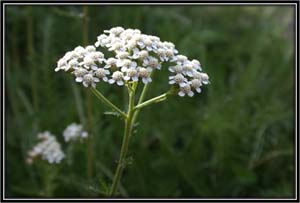- Yarrow is a herb. The above ground parts are used to make medicine.
Contents
Uses
- Yarrow is used for fever, common cold, hay fever, absence of menstruation, dysentery, diarrhea, loss of appetite, gastrointestinal (GI) tract discomfort, and to induce sweating.
- Some people chew the fresh leaves to relieve toothache.
- Yarrow is applied to the skin to stop bleeding from hemorrhoids; for wounds; and as a sitz bath for painful, lower pelvic, cramp-like conditions in women.
- In combination with other herbs, yarrow is used for bloating, intestinal gas (flatulence), mild gastrointestinal (GI) cramping, and other GI complaints.
- In foods, the young leaves and flowers of yarrow are used in salads.
- In manufacturing, yarrow is also used as a cosmetic cleanser and in snuff. Yarrow oil is used in shampoos.
Benefits
- Yarrow contains many chemicals that might affect blood pressure and possibly have anti-inflammatory effects.
Cautions
- Yarrow is LIKELY SAFE when taken by mouth in the amounts commonly found in food. However, yarrow products that contain thujone might not be safe.
- Yarrow is POSSIBLY SAFE when taken by mouth in medicinal amounts. In some people, yarrow might cause drowsiness and increase urination when taken by mouth. When it comes in contact with the skin, yarrow might cause skin irritation.
- Pregnancy and breast-feeding: Yarrow is LIKELY UNSAFE when taken by mouth during pregnancy as it can affect the menstrual cycle and might cause miscarriage. .
- There is not enough reliable information about the safety of taking yarrow if you are breast-feeding. Stay on the safe side and avoid use.
- Bleeding disorder: Yarrow might slow blood clotting. In theory, taking yarrow might increase the risk of bleeding in people with bleeding disorders.
- Allergy to ragweed and related plants: Yarrow may cause an allergic reaction in people who are sensitive to the Asteraceae/Compositae family. Members of this family include ragweed, chrysanthemums, marigolds, daisies, and many others. If you have allergies, be sure to check with your healthcare provider before taking yarrow.
- Surgery: Yarrow might slow blood clotting so there is a concern that it might increase bleeding during and after surgery. Stop taking yarrow at least 2 weeks before a scheduled surgery.
Interactions
Major Interaction Do not take this combination:
- Medications that slow blood clotting (Anticoagulant / Antiplatelet drugs) interacts with YARROW: Large amounts of yarrow might slow blood clotting. Taking yarrow along with medications that also slow clotting might increase the chances of bruising and bleeding.
- Some medications that slow blood clotting include aspirin, clopidogrel (Plavix), diclofenac (Voltaren, Cataflam, others), ibuprofen (Advil, Motrin, others), naproxen (Anaprox, Naprosyn, others), dalteparin (Fragmin), enoxaparin (Lovenox), heparin, warfarin (Coumadin), and others.
Moderate Interaction Be cautious with this combination:
- Lithium interacts with YARROWL: Yarrow might have an effect like a water pill or “diuretic.” Taking yarrow might decrease how well the body gets rid of lithium. This could increase how much lithium is in the body and result in serious side effects. Talk with your healthcare provider before using this product if you are taking lithium. Your lithium dose might need to be changed.
- Sedative medications (Barbiturates) interacts with YARROW:Yarrow might cause sleepiness and drowsiness. Medications that cause sleepiness are called sedatives. Taking yarrow along with sedative medications might cause too much sleepiness.
Minor Interaction Be watchful with this combination:
- Antacids interacts with YARROW: Antacids are used to decrease stomach acid. Yarrow may increase stomach acid. By increasing stomach acid, yarrow might decrease the effectiveness of antacids.
- Some antacids include calcium carbonate (Tums, others), dihydroxyaluminum sodium carbonate (Rolaids, others), magaldrate (Riopan), magnesium sulfate (Bilagog), aluminum hydroxide (Amphojel), and others.
- Medications that decrease stomach acid (H2-Blockers) interacts with YARROW: Yarrow might increase stomach acid. By increasing stomach acid, yarrow might decrease the effectiveness of some medications that decrease stomach acid, called H2-Blockers.
- Some medications that decrease stomach acid include cimetidine (Tagamet), ranitidine (Zantac), nizatidine (Axid), and famotidine (Pepcid).
- Medications that decrease stomach acid (Proton pump inhibitors) interacts with YARROW: Yarrow might increase stomach acid. By increasing stomach acid, yarrow might decrease the effectiveness of medications that are used to decrease stomach acid, called proton pump inhibitors.
- Some medications that decrease stomach acid include omeprazole (Prilosec), lansoprazole (Prevacid), rabeprazole (Aciphex), pantoprazole (Protonix), and esomeprazole (Nexium).
Other Names
Achilee, Achillea, Achillea borealis, Achillea lanulosa, Achillea magna, Achillea millefolium, Achillée, Achillée Boréale, Achillée Laineuse, Achillée Millefeuille, Acuilee, Band Man’s Plaything, Bauchweh, Birangasifa, Birangasipha, Biranjasipha, Bloodwort, Carpenter’s Weed, Civan Percemi, Common Yarrow, Devil’s Nettle, Devil’s Plaything, Erba Da Cartentieri, Erba Da Falegname, Gandana, Gemeine Schafgarbe, Green Arrow, Herbe à la Coupure, Herbe à Dindes, Herbe aux Charpentiers, Herbe Militaire, Huile Essentielle d’Achillée, Katzenkrat, Milefolio, Milenrama, Milfoil Millefeuille, Millefolium, Millefolii Flos, Millefolii Herba, Millegoglie, Noble Yarrow, Nosebleed, Old Man’s Pepper, Rajmari, Roga Mari, Sanguinary, Soldier’s Wound Wort, Sourcil de Vénus, Staunchweed, Tausendaugbram, Thousand-Leaf, Wound Wort, Yarrow Essential Oil.
References
Source: WebMD, “Yarrow”, www.webmd.com/vitamins-supplements/

